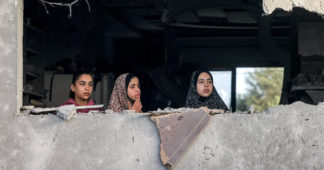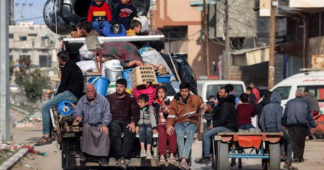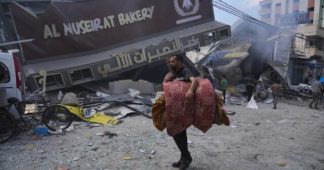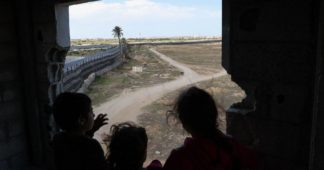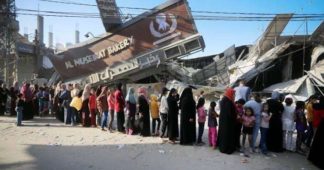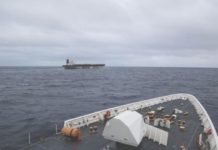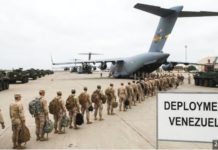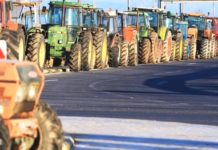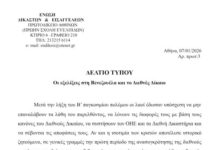May 6, 2024
The Israeli army announced on Monday that it issued an evacuation order for residents in the eastern outskirts of Rafah, in the southern Gaza Strip. The directive reportedly aims to prepare for an upcoming military operation in the area.
According to the announcement, residents and displaced Palestinians in the Al-Shoka municipality area, as well as neighborhoods like Al-Salam, Al-Jeneina, Tabbat Ziraa, and Al-Byouk, are required to leave their homes immediately.
They are instructed to head towards an “expanded humanitarian zone” located in Al-Mawasi, a coastal area between Rafah and Khan Yunis.
THERE ARE NO SAFE ZONES!!! #RAFAH WAS IT!!! And they know it!
IF YOU ARE STILL STAYING SILENT on the #genocide of tens of thousands of innocent peoples being bombed to smithereens on your phone screens, know that we know what you are: someone whose racism has made them Inhuman. pic.twitter.com/mkbpkXOyWZ
— onjali rauf (@OnjaliRauf) May 6, 2024
The Israeli Broadcasting Corporation (KAN) reported that the army has already begun deporting residents from the eastern parts of Rafah. Leaflets were distributed, urging people to evacuate and move to the designated humanitarian zone.
The decision to evacuate Rafah was made during a cabinet session held the previous night, as per Israeli Army Radio.
Approximately 100,000 Palestinians residing in the eastern neighborhoods of Rafah are affected by this evacuation process, while eyewitnesses have reported that some families have already started leaving the region.
Satellite images from the previous day revealed the deployment of around 300 Israeli military vehicles near the Rafah border.
Meanwhile, far-right Israeli Minister Bezalel Smotrich has called for an immediate invasion of Rafah.
Prime Minister Benjamin Netanyahu has also repeatedly expressed his determination to invade the region, despite international warnings about the potential humanitarian consequences for the city’s 1.4 million displaced residents.
Resistance Fights Back
The Palestinian Resistance has responded to Netanyahu’s threats, warning in a statement on Sunday that any Israeli forces entering Rafah will face severe consequences.
“If Netanyahu is threatening the resistance with an invasion of Gaza, it is now the factions that are warning him and everyone in the region about the consequences of what will happen,” the statement read.
“The region before the invasion of Rafah will not be the same as after it, and it is necessary for the Israeli side to realize that Rafah will not be a walk in the park,” it added.
For its part, the United Nations Relief and Works Agency for Palestine Refugees (UNRWA) emphasized the devastating impact of an Israeli attack on Rafah. UNRWA also said in a statement that it remains committed to providing life-saving assistance in the city.
On Sunday, hours before the evacuation began, the Israeli army reported that three soldiers from the Givati and Nahal brigades were killed, and 12 others were injured in a missile strike near the Kerem Shalom crossing, east of Rafah.
Israeli Army Radio disclosed that the missile attack involved 14 missiles, with two precision-guided missiles causing fatal injuries to the soldiers. The injured soldiers were part of a security mission guarding equipment and machinery in preparation for entering Rafah.
Gaza Genocide
Currently on trial before the International Court of Justice for genocide against Palestinians, Israel has been waging a devastating war on Gaza since October 7.
According to Gaza’s Ministry of Health, 34,683 Palestinians have been killed, and 78,018 wounded in Israel’s ongoing genocide in Gaza starting on October 7.
Moreover, at least 7,000 people are unaccounted for, presumed dead under the rubble of their homes throughout the Strip.
Palestinian and international organizations say that the majority of those killed and wounded are women and children.
The Israeli war has resulted in an acute famine, mostly in northern Gaza, resulting in the death of many Palestinians, mostly children.
The Israeli aggression has also resulted in the forceful displacement of nearly two million people from all over the Gaza Strip, with the vast majority of the displaced forced into the densely crowded southern city of Rafah near the border with Egypt – in what has become Palestine’s largest mass exodus since the 1948 Nakba.
Israel says that 1,200 soldiers and civilians were killed during the Al-Aqsa Flood Operation on October 7. Israeli media published reports suggesting that many Israelis were killed on that day by ‘friendly fire’.
(PC, AJA)
We remind our readers that publication of articles on our site does not mean that we agree with what is written. Our policy is to publish anything which we consider of interest, so as to assist our readers in forming their opinions. Sometimes we even publish articles with which we totally disagree, since we believe it is important for our readers to be informed on as wide a spectrum of views as possible.
